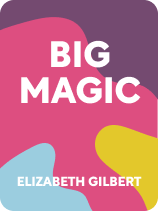

This article is an excerpt from the Shortform book guide to "Big Magic" by Elizabeth Gilbert. Shortform has the world's best summaries and analyses of books you should be reading.
Like this article? Sign up for a free trial here .
Is creativity an inborn quality? How do creatives develop novel ideas?
According to Elizabeth Gilbert, creativity can come to anyone who gets in touch with what she calls “Big Magic.” This force is bigger than us and cannot be explained scientifically or proven empirically. It is an eternal cosmic entity that creatives must have faith in.
In this article, we’ll explore Gilbert’s conception of creativity and two key ways Big Magic might come to you: via ideas and your genius.
What Is Creativity?
Gilbert defines a creative life as the search for and excavation of universe-endowed gifts that are within us, hidden from our view. Our gifts are the talents, interests, and desires that make us us. You can have a gift for anything—stargazing, website design, or mushroom hunting, for instance—not just a traditionally artistic pursuit, like painting, writing, or performing.
In practice, Gilbert’s idea of searching for a gift and becoming creative might look something like this: All your life, you’ve felt that you get along well with animals. You’re not sure why, but it seems as though you can understand them better than other people can. Finally, after years of feeling this way, you decide to test out your hunch by volunteering at your local animal shelter. To your delight, you find that the shelter animals do indeed respond well to you. You are great at training them, playing with them, and bonding with them. Injured or abused animals grow healthier under your care. You have just excavated a creative gift that has always lived inside you, but which you never before searched for.
According to Elizabeth Gilbert, creativity is not a professional pursuit or even the main goal or mission of one’s life. It’s simply a commitment to exploring your depths and bringing to light the powers that exist within you.
| Other Definitions of Creativity Gilbert’s conception of creativity for this book is unique, perhaps because seasoned creators develop idiosyncratic definitions of this concept. If Gilbert’s definition doesn’t fully resonate with you, fellow writer Amy Tan has her own definition, which she presented in a popular TED Talk. Tan feels her creativity is the product of her upbringing, the big questions that preoccupy and interest her, and her quest to derive meaning from the world. Steve Jobs’s definition of creativity was different still: He said that creativity was just a matter of forming novel connections. For Jobs, magic and mysticism figured far less into creativity than for Tan and Gilbert. Finally, Jazz musician Charles Mingus defined creativity similarly to Jobs in that he didn’t romanticize the creative process. Mingus felt that creativity was found in striving for simplicity, not uniqueness or newness. Being able to execute something simply and elegantly was, for him, the truest expression of creativity. As a creator, you may wish to come up with a definition of creativity that most resonates in your life. |
A Creative Life Gives You Access to Creative Sorcery
According to Gilbert, the central reason to develop your creativity is to come in touch with what she calls “Big Magic,” or, as we’ll call it moving forward, Creative Sorcery. In Gilbert’s view, Creative Sorcery is a mystical or spiritual force of creativity.
For Gilbert, coming into contact with Creative Sorcery is a transcendent experience. Touching Creative Sorcery lets you be moved by and interact with something greater than yourself. This communion with a higher creative energy constitutes the chief goal of Gilbert’s life.
| Other Forms of Spiritual Enlightenment Gilbert’s vision of touching Creative Sorcery has a lot in common with the search for spiritual enlightenment which humans all around the world and in all faith traditions seek out, either to stimulate creativity or to experience more general spiritual relief. Sufi Muslims, for example, perform a whirling dance to escape the confines of their egos, commune with God, and become spiritually perfect. Outside of faith, some use mind-altering drugs to come into contact with something bigger than themselves and even to enhance their creativity. Research has shown that psychoactive substances don’t activate creativity but do make drug-takers more sensitive and open to stimuli, which can indirectly lead to greater creativity. |
Creative Sorcery Communicates Through Ideas
Gilbert states that Creative Sorcery is trying at all times to contact humans to help them bring their creativity into the world. One way Creative Sorcery communicates with humans is through ideas. Gilbert envisions ideas as living entities, capable of self-sustained activity. Ideas move around space, seeking humans who will take them on and give them life.
According to Gilbert, humans do not give rise to ideas: Ideas exist independently of us. This means that ideas are free to come and go as they please. You may find yourself visited by an idea and then deserted by it.
Creative Sorcery Communicates Through Your Genius
For Gilbert, your genius is another manifestation of Creative Sorcery: It’s an external creative spirit that can help you as you work. Gilbert draws on the Roman and Greek conception of genius to craft this definition. For ancient thinkers, a genius was a creative imp or “daemon” that resided in your house. That imp would sometimes appear to assist you in your pursuits.
Gilbert emphasizes that your genius is not a part of you. It is, rather, an outside entity that sometimes visits you. In this regard, a genius is similar to ideas. Yet, while there are many ideas floating around the universe, you only have one genius.
| Drawing on Ancient Conceptions of “Genius” The personal, singular, visiting “daemon” of genius to which Gilbert refers here has classically been called a eudaemon. Both Gilbert’s genius and the Ancient Greeks’ eudaemon promote personal improvement. What’s more, just as Gilbert argues we each only have one genius, in the ancient world people believed that children were assigned a single, personal daemon at birth, which represented their best possible selves. Yet Gilbert’s genius differs from the eudaemon in subtle ways. While Gilbert’s conception of the genius helps you be a stronger creative specifically, the eudaemon helps you be a better person in general. Additionally, unlike Gilbert’s genius, which appears whenever it wants, the eudaemon appeared at opportune times to guide the person’s choices. Socrates, for instance, felt his eudaemon made itself known when he was making difficult decisions and dissuaded him from making the wrong choice. |
Your Genius Aids Your Creative Process
Gilbert adds that when your genius is helping, your creative process becomes more fluid. You might be struggling to make progress on an idea and then suddenly realize you’ve just spent hours fully and blissfully immersed in your work—that was your genius lending a hand. But your genius is not going to be reliably present when you’re working on a project. It comes and goes as it pleases, claims Gilbert.
| Genius and the Concept of Flow Gilbert’s visits from your genius that leave you absorbed in your work have a lot in common with Mihaly Csikszentmihalyi’s concept of flow, outlined in his book of the same name. Flow is a state of concentrated, purpose-driven work that is enjoyable and immersive. But unlike Gilbert, who says you have to wait for your genius to appear, Csikszentmihalyi proposes active ways to achieve a flow state. First, set a specific, appealing aim that you can get lost in and a way to measure progress toward it. Next, concentrate on working towards your aim, keeping an eye out for opportunities for new approaches and learning. Finally, keep challenging yourself to avoid complacency and boredom, which inhibit flow. |

———End of Preview———
Like what you just read? Read the rest of the world's best book summary and analysis of Elizabeth Gilbert's "Big Magic" at Shortform .
Here's what you'll find in our full Big Magic summary :
- Why integrating creativity into your daily life will make you feel more fulfilled
- Why creating for money is a form of self-sabotage
- Why you should never focus on external validation of your creations






